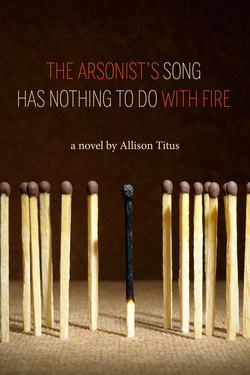Читать книгу The Arsonist's Song Has Nothing to Do With Fire - Allison Titus - Страница 16
На сайте Литреса книга снята с продажи.
ОглавлениеMuch later Vivian stared at the guest room ceiling, thinking about it. If she died in this city, it would be from drowning. Helen’s house wasn’t far from the lake and Vivian couldn’t swim. Late November afternoons always turned colder and darker faster than you expected. It would be tragic, sure, but barely publicized, because around here the half-hearted gang-crime dominated local news. She closed her eyes, held her breath and tried to imagine it. The pitch black, the thick water that pulled through her clothes, pummeled her arms her legs her face and burned sharp as it flooded her nose, mouth, throat, lungs—she’d choke hard before blacking out, which she knew would be painful but she wasn’t sure how, exactly; would she pass out before or after she felt her legs go numb, before or after her arms grew too heavy to lift. The cause of death would be logged in some med. tech.’s chart as Asphyxiation, not suffocation, but that’s all drowning was, a suffocation. What bothered her was how long it would take, would it be minutes or hours? How long would she drift like that in the water, jetsam? She would have to research death by drowning.
Then she remembered. And how did she forget, anyway. How did she lose track of the particulars enough to forget and then be reminded. Except how your hand forgets skin and skin forgets muscle. How it all just endured in the meantime, three entire days passed and she hadn’t called. It didn’t matter. Maybe her mother answered and she was still alive out there, in whatever that Nebraskan ghost town was, that shelf of dust where her trailer was slung. But maybe she didn’t answer, twelve rings nothing, twenty rings nothing, because maybe she was dead. There was no way to know whether she was dead or not, unless at some point she answered. In a few days, a week, two weeks. So Vivian called and called and hung up on her mother. They hadn’t spoken since her mother left North Carolina for Nebraska’s broken radios and half-empty storefronts, maybe six, maybe seven years ago. She pictured her mother pacing back and forth in a barely-heated trailer. Hinged on an overgrown lot. A trailer with carpet and walls dingy like dredged up oyster casings. The squawk of her pet bird, Picnic, if Picnic was still around. A loud television.
Three days had passed and she hadn’t called. Her mother wouldn’t notice. She didn’t remember Vivian, Vivian’s brother (Seth), or what century was dawning (it was 1989). But unless she called and hung up, Vivian couldn’t stop thinking through the desperate scenarios. A broken wheelchair; rats in the kitchen; a man with a rifle pounding through the trailer door with the blunt of it. She felt guilty, thinking about her mother alone, out in the middle of nowhere, even if she’d chosen exile. That almost made it worse.
Vivian sneaked out of her room, skirted the kitchen, and ducked into the office. She closed the door until it was almost flush with the threshold but not caught; a strand of light fell through from the hallway. The phone was an old cordless and dull static buzzed through the reception. She punched in the numbers and waited. She could make out some books on the shelf above the desk, mostly unfamiliar birds and geographies. Birds of the West Indies by Houser. Three rings, four rings. White-Bellied Emeralds and Red-Legged Honeycreepers of Belem. Six rings. All those wires traipsing the skies from anywhere to anywhere else, crossing fields, eight rings, and highways and irrigation canals and rivers and mountain ranges and deserts and parking lots and glaciers, erected, nine rings, against great spaces in hopes of a voice on the other end, signals and waves arranged into a recognizable pattern.
“Hello,” the voice insisted, “hello, hello, who—”
Vivian hung up. She could never bring herself to say anything. And what was there to say? She couldn’t bear to introduce herself.
As she slipped back down the hall, she looked over at the stairs, down to where they curved to the foyer, and hesitated. Helen was down there, sitting on the bottom step, her forehead bent to her knees. Vivian watched, kind of frozen in place. Grief was a thing that filled every air sac of your kidney-shaped lungs but all it left you with was a hollow, defeated posture, kind of a weakness at the ribcage. To ache for someone, every brutal hour with no news—Vivian would rather be the one who was lost, distracted by efforts to get found, not the one back home, left to deconstruct conspiracies and post fliers. As she stood there, she realized Helen was crying. First her shoulders then her whole tucked-over body shuddered. Embarrassed to see her like that, to think that Helen could know she’d seen her like that—crumpled up, a little out of control—Vivian held her breath as she crept back to her room, careful not to make any noise. She closed her eyes and pretended to sleep and practiced drowning.
